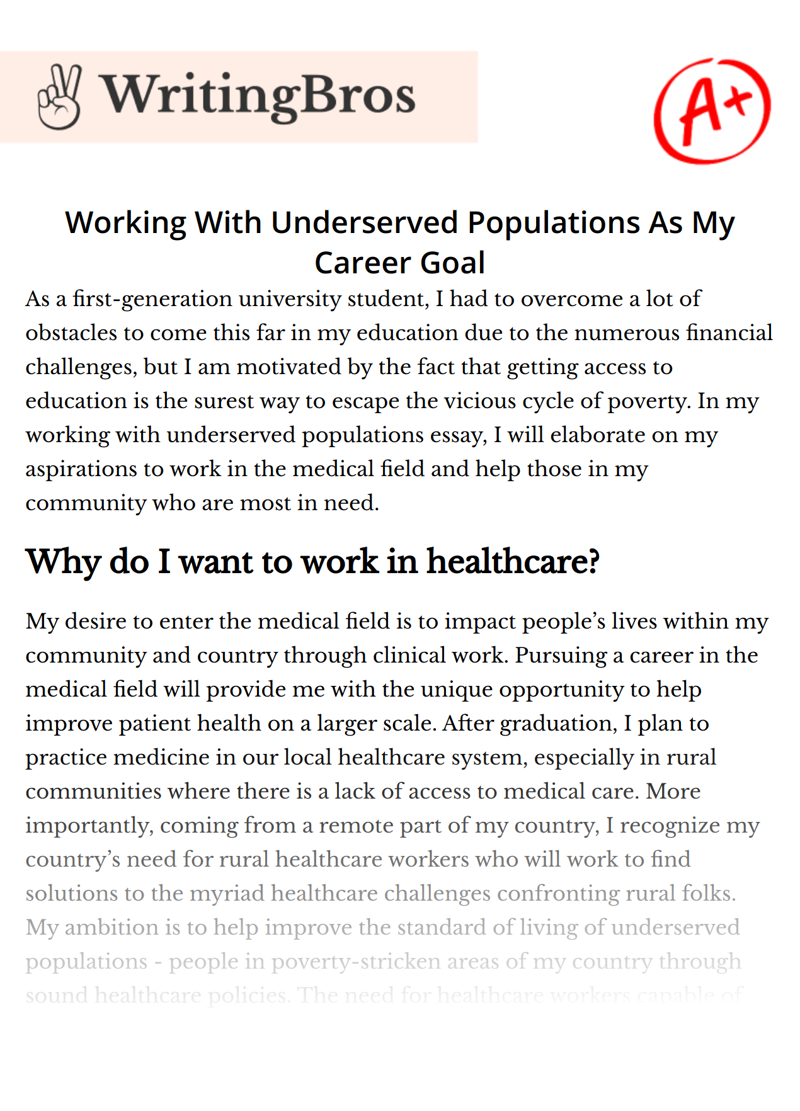Working With Underserved Populations As My Career Goal

As a first-generation university student, I had to overcome a lot of obstacles to come this far in my education due to the numerous financial challenges, but I am motivated by the fact that getting access to education is the surest way to escape the vicious cycle of poverty. In my working with underserved populations essay, I will elaborate on my aspirations to work in the medical field and help those in my community who are most in need.
Why do I want to work in healthcare?
My desire to enter the medical field is to impact people’s lives within my community and country through clinical work. Pursuing a career in the medical field will provide me with the unique opportunity to help improve patient health on a larger scale. After graduation, I plan to practice medicine in our local healthcare system, especially in rural communities where there is a lack of access to medical care.
More importantly, coming from a remote part of my country, I recognize my country’s need for rural healthcare workers who will work to find solutions to the myriad healthcare challenges confronting rural folks. My ambition is to help improve the standard of living of underserved populations - people in poverty-stricken areas of my country through sound healthcare policies. The need for healthcare workers capable of mapping out healthcare strategies to solve health challenges cannot be underemphasized; hence my application for this scholarship program to fund the remaining years of my studies.
As a way of giving back to the community during vacations, I spent some time doing community service at the local hospital in my community. I also go on medical outreach in isolated communities around the country to provide free medical services, also try to improve my own community's quality of life by volunteering with our community clinic during vacations, which provides free healthcare services such as health screening and donation of medicines to clinics in remote areas of the country. My experience volunteering has shown me the value of working with underserved populations.
After graduation, I want to undertake various projects to improve the standard of living and quality of health of underserved populations in my country. The first project I want to undertake is to open a free mobile clinic that will serve my community and its environs to provide free medical assistance to underserved populations regardless of the patient's race, gender or sexual orientation. The diverse health services would include free consultations and free medications. I believe this initiative will greatly help to bridge the healthcare disparity gap and provide the needed healthcare intervention to marginalized communities, especially indigenous groups from poverty-stricken part of the country
However, these beautiful plans will only remain a dream if I am not able to get the needed financial assistance to able to complete my medical degree. Sadly, due to unexpected financial crisis, I am at risk of dropping out of medical school if I don’t get sponsorship. This situation has arisen because my mother is battling with stroke resulting in financial difficulty. She works as a petty trader, but the money she earns is not enough to pay for my medical school, her medical bills and also cater for my younger siblings.
I am grateful to find opportunities like the one your foundation is providing to students like myself who are constantly fighting for the right to receive an education. This scholarship will be an opportunity to fully focus my attention on the main objective of achieving the best I can in the Bachelor of Medicine and Surgery program. I will strive to be a good representative and ambassador of WMF throughout my future career.
References
- American Association of Colleges of Nursing. (2019). Working with vulnerable populations. https://www.aacnnursing.org/News-Information/Fact-Sheets/Working-with-Vulnerable-Populations
- Betancourt, J. R., Green, A. R., Carrillo, J. E., & Ananeh-Firempong, O. (2003). Defining cultural competence: A practical framework for addressing racial/ethnic disparities in health and health care. Public Health Reports, 118(4), 293–302. https://doi.org/10.1016/s0033-3549(04)50253-4
- National Institute on Minority Health and Health Disparities. (2021). Minority health and health disparities research. https://www.nimhd.nih.gov/programs/edu-training/minority-health-disparities-research.html
- Purnell, L. D. (2013). Guide to culturally competent health care. F.A. Davis Company.
- Smedley, B. D., Stith, A. Y., & Nelson, A. R. (Eds.). (2002). Unequal treatment: Confronting racial and ethnic disparities in health care. National Academies Press.
Cite this Essay
To export a reference to this article please select a referencing style below

